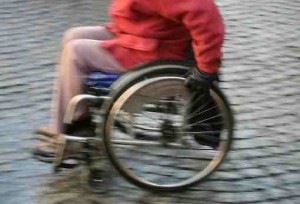
According to the Government’s own impact assessment, two-thirds of households affected contain someone with a disability. Photograph: Getty Images
Arts leaders must do more to tackle the “acute” lack of opportunities for disabled actors on stage and screen, according to union delegates.
Members of the Equity performers’ union called for “greater representation and more accurate portrayal” of disabled people, in a motion agreed unanimously by the TUC Disabled Workers Conference in London.
The motion also called for “greater inclusive casting… where an actor’s talent and not their impairment drives their talent on stage or screen”.
Actor Cindy-Jane Armbruster told the conference that disabled people were portrayed as “the objects of pity or we are put on a pedestal as superhumans in so-called inspiration porn, or objects of scorn as benefit scroungers… anything but well-rounded human beings”.
She said: “I believe very strongly that we need to change these stories, we need to tell better stories, we need to see ourselves represented on stage and on screen for our sense of self-identity. We need to know we are not alone.”
She pointed to a survey last year by the Act for Change project, which campaigns for better representation across the live and recorded arts and found that just one in 326 actors performing on the London stage over the Easter weekend had a visible impairment.
She added: “Having stories told about us and by us will make it harder for policy-makers to make us invisible, to dehumanise us or, worse, get rid of us.”
Heidi McGeogh, of the Musicians’ Union, told the conference: “We really do need to see positive images of disabled people.
“It’s going to affect how we are treated by society and how we are valued by society.
“People believe what they see on the telly and on the stage and read in the papers.”
Iain Scott-Burdon, a BSL-user from Unison, said: “I don’t like to see false disabled people.”
He pointed to TV companies that were making programmes featuring hearing actors playing BSL-users.
He said: “This is unacceptable. There is a lot of Deaf talent out there. There’s a lot of disabled talent out there.”
Mik Scarlet, another Equity member, told the conference that he used to work on BBC’s From the Edge magazine programme, which had nine disabled presenters and more than 30 disabled programme-makers, while Channel 4 and ITV also put out disability programmes.
The disabled journalist and presenter said: “Where have they gone? They have disappeared. Now we have The Undateables and the [Paralympic] Superhumans.
“We need more talent on screen, and we need to promote the concept that we need disabled programming made by disabled people.”
Roddy Slorach, a University and College Union (UCU) delegate, and author of A Very Capitalist Condition, which examines the history and politics of disability, said the representation of disability in the media needed to be about “overcoming this sense of otherness”, which was “not actually an easy thing to do”.
He called for “an end to disability as a form of discrimination” and “a celebration of the diversity of humanity” that looks at who disabled people are rather than using “negative stereotypical images”.
The conference was attended by 25 unions, from major organisations such as Unison, Unite and NUT, to smaller unions such as the Chartered Society of Physiotherapy and the senior civil servants’ union the FDA, with nearly 200 disabled delegates attending.
26 May 2016

No responses yet